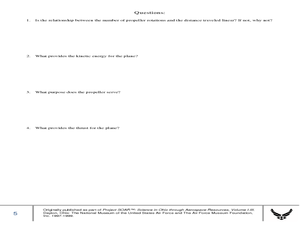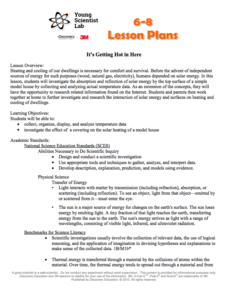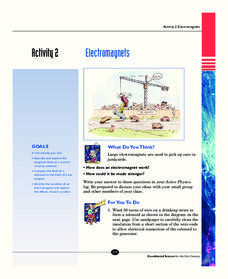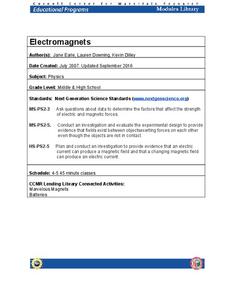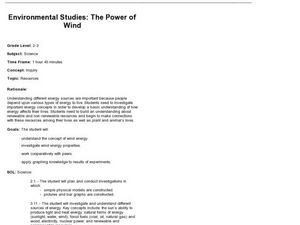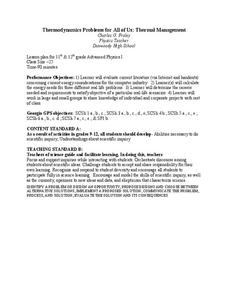Curated OER
Physics: Electricity and Magnetism
Young scholars draw series and parallel electrical circuits. In this electromagnet lesson, students describe how current changes depend on circuit components. Young scholars use an OHT of a series and parallel circuit to predict the path...
Curated OER
Propellers, Forces and Energy
Students construct a model airplane, measure distance, and calculate velocity. In this creative instructional activity students work in groups to build a model and use it to calculate distances and velocity.
Curated OER
Food Intake and Physical Activity
Fourth graders graph their estimations of caloric intake and caloric expenditures.
Curated OER
Discovery Science Library: The Basics Physical Science
Young scholars examine friction and gravity. affect four sports. In this scientific discovery lesson, students examine how friction and gravity affect sports. They discuss, write, and illustrate the effect of different forces on various...
Curated OER
Matter and Energy
Students participate in a small group read aloud of the short story, "Cerium" by Primo Levi. They answer several questions about the story and then relate the reading to a lecture on Kinetic theory. After the lecture they apply the...
Cornell University
Catapults
Ready, aim, fire! Launch to a new level of understanding as scholars build and test their own catapults. Learners explore lever design and how adjusting the fulcrum changes the outcome.
Tech Museum of Innovation
Tree House Escape
Use simple machines to escape from a tree house. Pupils learn about simple machines and how they are useful in everyday life in a STEM lesson. Groups then design a device to rescue a friend stuck in a tree house.
University of California
Hot! Hot! Hot!
Calories are not tiny creatures that sew your clothes tighter every night, but what are they? A science activity, presented at multiple levels, has learners experiment with heat, heat transfer, and graph the function over time. It also...
Cornell University
Atomic Bonding
Explore the connection of surface area to bonding within atoms. Learners complete lab investigations to model changing surface area with different sizes and concentrations of atoms. A flour fireball demonstration follows the labs to...
Discovery Education
It's Getting Hot in Here
Class members engage in a STEM experiment and investigate how materials affect heating in a house by creating models of houses and using different top surface materials. They record the temperature inside the models and consider what the...
NASA
Photons in the Radiative Zone: Which Way Is Out? An A-Maz-ing Model
Can you move like a photon? Young scholars use a maze to reproduce the straight line motion of a photon. The second in a six-part series of lessons on the sun has learners measure angle of incidence and refraction to determine the path...
It's About Time
Electromagnets
Young scientists build their own electromagnet and test it by picking up paperclips. Analysis questions evaluate knowledge at the end of the activity.
Cornell University
Electromagnets
Discover the connection between electric current and magnets. Scholars create electromagnets by passing a magnet through a coil. They experiment with different materials to determine the variables that affect the strength of the current.
Curated OER
Environmental Studies: The Power of Wind
Investigate the prospect of wind as a renewable resource. Second and third graders make a pinwheel, answer critical thinking questions, and then attempt to use wind power to wind string. I would be more apt to use this lesson in a 1st or...
Curated OER
Science in baseball
Sixth graders examine how science is used in everyday activities, such as baseball.
Curated OER
Why did the can crush?
Students watch a demonstration to ascertain why a soda can crushed. They make observations and hypothesize about why a soda can crushed and relate the difference in pressure to its affect on objects around us (soda can). Explanation is...
Brooklyn Children’s Museum
Inside India
What can a Ganesh statue, hand ornament, and print block tell you about India? Introduce your learners to the geography, history, and culture of India by analyzing primary sources and using the well-designed worksheets provided in this...
PHET
Planet Designer: Retro Planet Red
What does the atmosphere on Mars look like? This fourth lesson in the series of five is designed for high schoolers. Scholars apply previous knowledge to add atmosphere to Mars in an online simulation. This comprehensive lesson includes...
NASA
Stellar Fingerprints and Doppler Red Shifts
Young scientists observe the spectra of elements and compare that to the Doppler effect. Hook scholars from the beginning all the way to the extension activities in this 5E-format lesson.
Curated OER
Ballistic Pendulum Lab
Students determine the muzzle velocity of projectile launcher. In this physics lesson, students compare the pendulum method and kinematic method in calculating the initial velocity. They analyze data and discuss results in class.
Curated OER
Investigation of Hooke's Law Lab
Learners determine the spring constant by conducting an investigation. In this physics lesson plan, students collect data and create a graph of force vs. displacement. They compare the results of two different methods to find spring...
Curated OER
Thermodynamics Problems for All of Us: Thermal Management
Pupils evaluate current literature on the Internet and in handouts about the energy considerations for the computer industry and calculate energy needs for real life problems. Working in groups, they present the problem they researched,...
Curated OER
Making a Battery
Fifth graders make a battery. In this physical science lesson, 5th graders word in pairs make the battery. Students follow 4 steps to create the battery.
Curated OER
Simple Machines or Are They?
Students discover basic machines and how they make completing work easier. They identify two basic machines, the inclined plane and the lever and the functions of these simple machines.



